Transferts monétaires et mobilité humaine
Les transferts monétaires sont souvent utilisés lors de crises afin de répondre aux besoins des personnes migrantes. Dans cette page, vous trouverez des ressources sur les transferts monétaires et la migration.

La Croix-Rouge se prépare à fournir une aide humanitaire aux migrant·es de la caravane sur le point de quitter le Honduras pour le Guatemala.
©Johannes Chinchilla / FICR.
Conflits, crises économiques et catastrophes sont autant de raisons ayant contraint des personnes à fuir et à traverser des frontières dans des conditions éprouvantes et risquées, en quête de sécurité et de moyens de subsistance. En 2020, le nombre de personnes déplacées de force s’est envolé au niveau sans précédent de plus de 80 millions de personnes, soit près du double du nombre enregistré il y a une dizaine d’année. Cette tendance s’aggrave et les effets du changement climatique menacent de déplacer jusqu’à 200 millions de personnes d’ici 2050.
L’assistance monétaire est de plus en plus utilisée afin de répondre aux besoins des personnes en situation de déplacement. On y a eu recours à grande échelle dans différents contextes de migration, en Europe en 2015 jusqu’au Venezuela pour « los caminantes ». Elle a également été utilisée dans d’autres crises migratoires, notamment en Amérique centrale, au Sahel, en Méditerranée et dans la Corne de l’Afrique. L’assistance monétaire est à l’heure actuelle l’une des principales formes d’aide apportée aux populations déplacées en Ukraine et dans les pays voisins.
Il existe une myriade de perspectives et de définitions concernant le mot « migrant·e » et la façon dont les humanitaires doivent agir. C’est pourquoi nous ne choisissons pas une définition unique pour le moment, étant donné que les discussions sur l’assistance monétaire et la migration en sont encore à leurs prémices et que le langage évolue encore.
Documenter et partager les données probantes donnera lieu à des interventions plus efficaces. Cette page contient une sélection de ressources utiles concernant la migration et le recours à l’assistance monétaire. Elle sera mise à jour au fil des discussions ayant lieu dans les espaces humanitaires des transferts monétaires.
Priorités actuelles
Afin de contribuer aux progrès relatifs à cet enjeu, nous nous engageons à :
- soutenir la création de données probantes aux niveaux régional et mondial ;
- contribuer aux solutions pratiques visant à mettre en œuvre les transferts monétaires auprès des personnes migrantes ;
- organiser des discussions sur les enjeux majeurs basées sur des données probantes.
Contenu récent

Cash Impact on Food Security and Non-Food Outcomes: Ministudy II
Report
To better understand how different amounts and frequencies of cash transfer impact household food security outcomes and non-food outcomes (food well-being, financial well-being, ability to cope with shocks and stresses and household well-being), this study compared the project outcomes for 3 groups: a...

The potential of Cash and Voucher Assistance to empower women and reduce violence evidence
Report
On April 29 and 30th in Washington DC, CARE and UNWOMEN, on behalf of the gender and cash sub-workstream of the Grand Bargain, convened a workshop with the objectives of:
• Sharing and exchanging existing knowledge, experiences, and good practices;
• Exploring and prioritizing research gaps on cash...
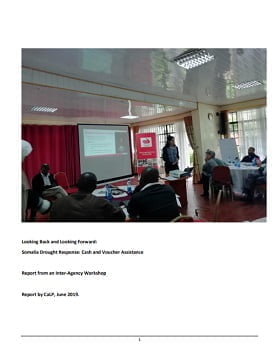
Looking Back and Looking Forward: Somalia Drought Response: Cash and Voucher Assistance
Case Study
This report summarizes the discussions that took place during a one-day learning event on 11th June 2019. The event brought together 27 people from national and international NGOs, the UN, and donors to discuss progress, reflect on cash and voucher (CVA) assistance in Somalia and identify priorities for...

The Digital Lives of Refugees: How displaced populations use mobile phones and what gets in the way
Report
GSMA in partnership with UNHCR conducted quantitative surveys and qualitative research to understand the ways in which refugees are using mobile phones in order to help guide digital interventions by humanitarian organisations and mobile network operators. The research identifies key trends, statistics,...

ACTION PLAN: Initiating Linkages between Humanitarian Multi-Purpose Cash Assistance (MPCA) and MoLSA’s Social Protection Network (SPN) in Iraq
Guidelines and Tools
On 17-18 April 2018, a two day workshop was held in Baghdad aimed at strengthening linkages between Cash Working Group (CWG) humanitarian multi-purpose cash assistance (MPCA) and the Government of Iraq’s Ministry of Labor and Social Affairs (MoLSA) Social Protection Network (SPN). The event occurred...
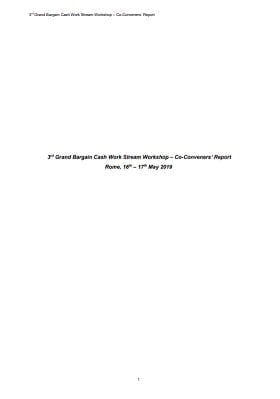
3rd Grand Bargain Cash Work Stream Workshop – Co-Conveners’ Report
Report
The third Grand Bargain (GB) Cash work stream Workshop was held at WFP Headquarters in Rome on 16th-17th May 2019, hosted by WFP and DFID. Over 85 participants attended the workshop, representing 60 donor and humanitarian organisations and multilateral agencies, and including representatives from the...
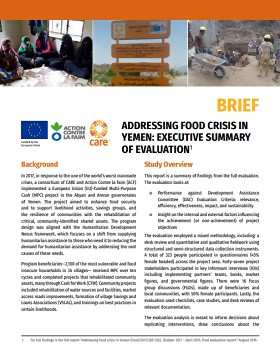
Addressing Food Crisis In Yemen: Executive Summary
Report
This report is a summary of findings from the full evaluation.
The evaluation looks at:
■ Performance against Development Assistance
Committee (DAC) Evaluation Criteria: relevance,
efficiency, effectiveness, impact, and sustainability
■ Insight on the internal and external factors influencing
the...
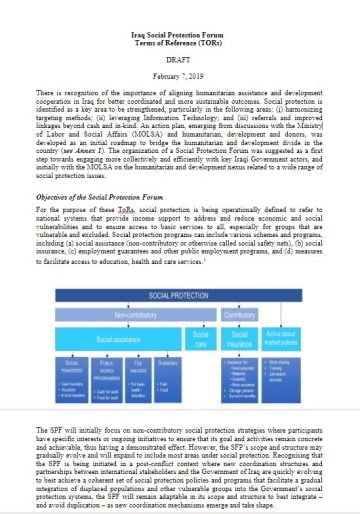
Iraq Social Protection Forum – Terms of Reference (TORs)
Guidelines and Tools
There is recognition of the importance of aligning humanitarian assistance and development cooperation in Iraq for better coordinated and more sustainable outcomes. Social protection is identified as a key area to be strengthened, particularly in the following areas: (i) harmonizing targeting methods;...
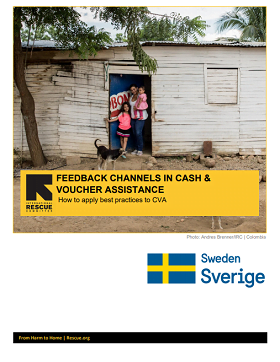
Feedback Channels in Cash and Voucher Assistance: How to Apply Best Practices to CVA
Guidelines and Tools
Accountability is at the core of effective humanitarian programming, and it is our duty to ensure that all programs – including those that use CVA to meet outcomes – are responsive to the clients we serve. While CVA is not inherently more risky than other forms of assistance, there are specific...
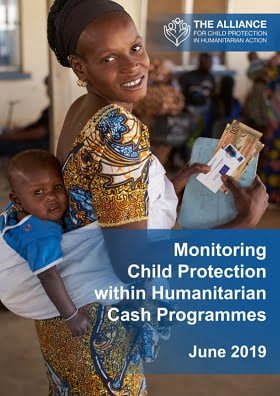
Monitoring Child Protection within Humanitarian Cash Programmes
Guidelines and Tools
This paper summarises findings from an initial scoping study, which seeks to review how child protection outcomes are captured when monitoring multi-purpose humanitarian cash programmes. The study intends to inform the development and piloting of new approaches to integrating child protection concerns...

Cash Assistance and the Prevention, Mitigation and Response to Sexual and Gender-Based Violence
Report
The study Cash Assistance and the Prevention, Mitigation and Response to Sexual and Gender-Based Violence (SGBV) is based on comprehensive research in Lebanon, Ecuador and Morocco. It provides learning and recommendations when using cash assistance in the prevention, mitigation and response to SGBV. The...
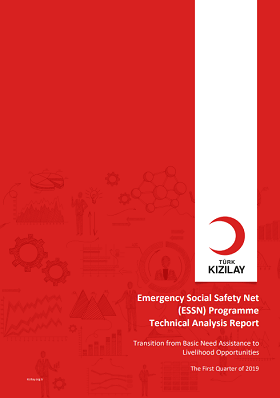
Emergency Social Safety Net (ESSN) Programme Technical Analysis Report
Report
The Emergency Social Safety Net Programme (ESSN) was launched as
a result of partnership between the European Union and Turkey on
20 October 2016 as a pilot study. The programme which provides
cash assistance through Kızılaykart to 1.5 million foreigners that meet
the criterion was extended nationwide...
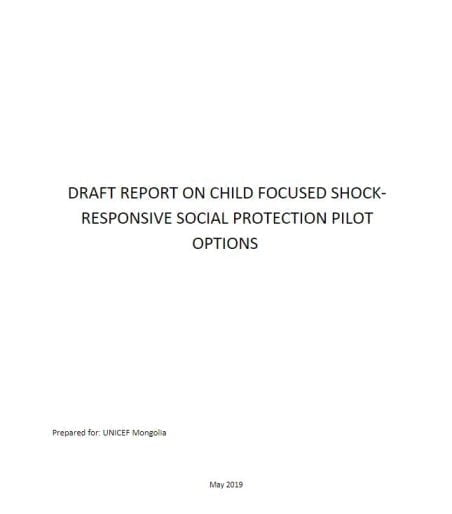
Draft Report On Child Focused Shock-responsive Social Protection Pilot Options
Report
UNICEF seeks to work together with other development partners to support the Government of Mongolia (GoM) to pilot a shock-responsive social protection (SRSP) program in order to demonstrate the value of mainstreaming SRSP into the national social protection system and to generate lessons on whether and...
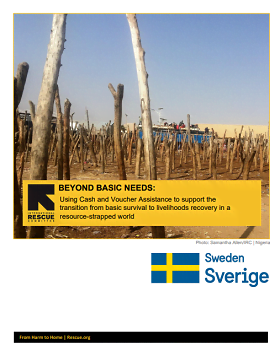
Beyond Basic Needs: Using Cash and Voucher Assistance to Support the Transition from Basic Survival to Livelihoods Recovery in a Resource-Strapped World
Guidelines and Tools
Do you think of yourself as a “cash” person OR as a “livelihoods” person? An “emergency” practitioner OR a “recovery” practitioner? Or do you find yourself unsatisfied with the often narrow implications of these terms? We’ll never have enough funding to provide basic needs support to...

Indicateurs de résultats des transferts monétaires à usages multiples : Projet final à tester
Guides et outils
Les indicateurs présentés dans ce document se concentrent sur les principaux objectifs des TMUM humanitaires et sur les résultats auxquels les transferts monétaires à usages multiples peuvent le plus fortement contribuer. (Par exemple, certaines interventions en TMUM visent à relier les personnes...

Quantitative assessment of the social assistance system of the Kingdom of Eswatini
Report
Analysis of social assistance needs, coverage of needs by existing programs and identification of social assistance gaps in Eswatini
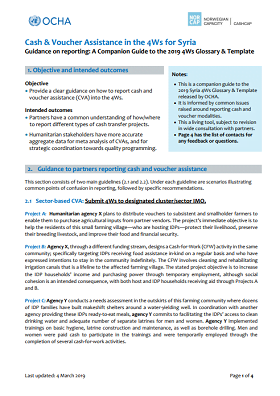
Cash & Voucher Assistance in the 4Ws for Syria Guidance on reporting: A Companion Guide to the 2019 4Ws Glossary & Template
Guidelines and Tools
Objective
• Provide a clear guidance on how to report cash and voucher assistance (CVA) into the 4Ws.
Intended outcomes
• Partners have a common understanding of how/where to report different types of cash transfer projects.
• Humanitarian stakeholders have more accurate aggregate data for meta...
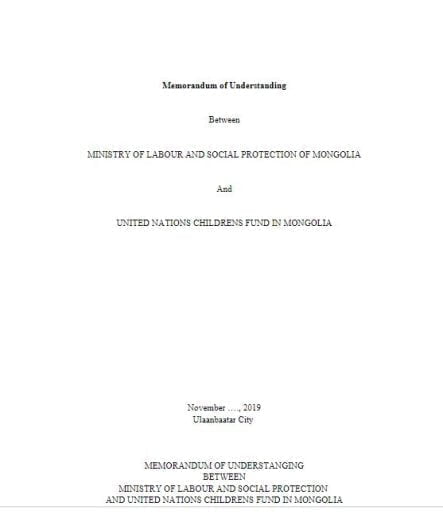
Memorandum of Understanding Between Ministry Of Labour And Social Protection Of Mongolia And Unicef
Guidelines and Tools
This Memorandum of Understanding (MoU) sets forth the terms and understanding between the MLSP and UNICEF Mongolia to collaborate to implement a Child-focused Shock-Responsive Social Protection (SRSP) Pilot (the Climate Emergencies Child Grant), which will be separate from but based on the implementation...

Cash transfer Programmes – Impact on Stunting and Financial Inclusion
Report
This report focussed on evidence published in the last ten years (since 2009) on cash transfer programs’ impact on stunting and financial inclusion. The importance of maternal education on stunting emerged from the literature and warrants further investigation, which was outside the scope of this...

CVA for Protection: A Mapping of IRC’s Use of Cash and Voucher Assistance to Help Achieve Protection Outcomes
Guidelines and Tools
The IRC first began to integrate cash into protection programs in 2013, leveraging the flexibility of CVA to support clients living in urban refugee contexts in the Middle East. Since then, IRC has rapidly expanded its use of CVA to help achieve protection outcomes. This scale-up has come with important...